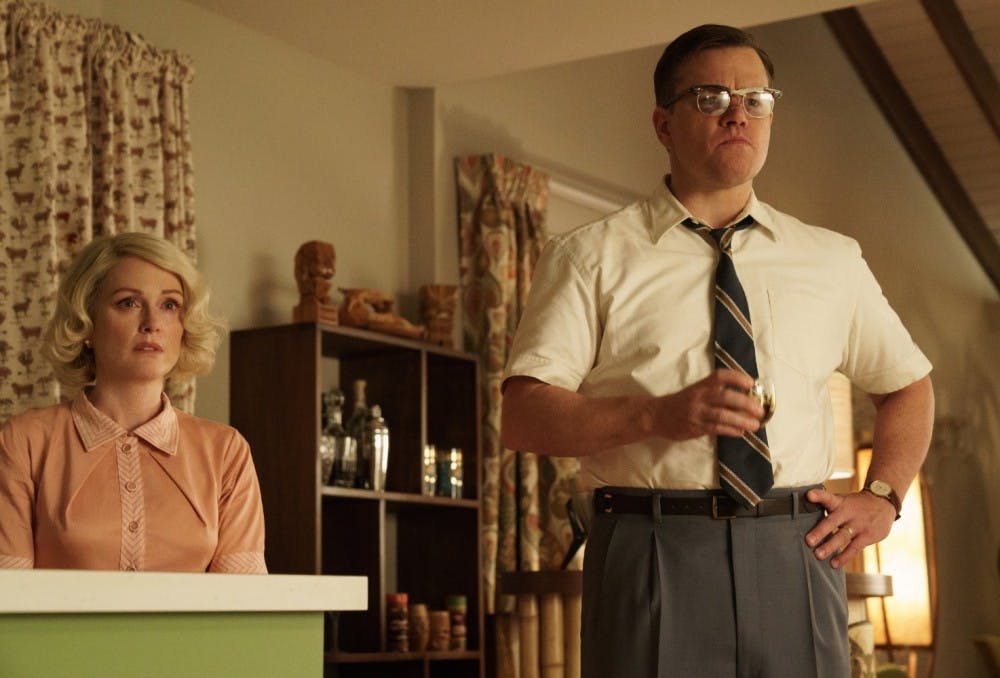Ethan and Joel Coen could probably be typecast as the pair of most unpredictable screenwriters in Hollywood in terms of their success. “Hail Caesar” and “Bridge of Spies,” for instance, reached 85 and 91 percent respectively among critics, according to Rotten Tomatoes. On the other hand, “Unbroken” and “Gambit” earned 51 and 17 percent respectively. While their films are unpredictable in quality, in “Suburbicon” their voices seem to be unintelligible.
“Suburbicon,” written by the Coen brothers and directed by George Clooney, is set in perhaps the whitest community in the 1950s. Painted as the safest and most ideal place to raise a family America has ever seen, underneath the town’s surface there lies dark secrets. After the murder of his wife, Gardner Lodge, played by Matt Damon, must navigate these darker sides of suburban life in order to try and keep things peaceful in the quiet town or else expose a secret he’d rather leave hidden.
From the first second, the film is unnerving and confusing.
It doesn’t open with the Lodge family, but instead introduces the newest residents of the community: its first African-American family. Boy, does this throw the community for a spin. Members immediately voice their concerns at a town meeting explicitly saying they don’t like the new family and the film starts to feel less about the Lodge family — who at this point is still nowhere to be seen — and more about the blatant racism in the community.
Right as the audience begins to become invested in the story, the film takes a dramatic shift to the Lodge family as we see them react to the sudden murder of Mrs. Lodge during a robbery and are now trying to meander through the repercussions.
It’s a swift turn from the clear point to racism in the film’s opening moments and its hard to figure out exactly what story the Coens are trying to tell. In fact, the most interesting moments of the first act were the ones dealing with racism, making Lodge and company feel misplaced.
The film quickly picks up during a police line up when Lodge’s son Nicky, played by Noah Jupe, sneaks in to see his mother's killers. As he slides through the door, he hears his father and Aunt Margaret, played by Julianne Moore, lie to the police about who the killers are.
Now the film becomes a question of what really happened to Mrs. Lodge (also played by Moore) and what is the motive? While this happens, several cuts are made to the African-American family so the audience can see just how horribly they are treated. These transitions are jarring and sometimes misplaced.
This would be the film's greatest weakness as the Lodge's story gets lost in translation between the cuts. Both stories are equally interesting for completely separate reasons and makes wanting to spend more time in each the primary concern. As confusing as these transitions are though, their purpose makes sense in the grand scheme.
The film is largely an over-dramatic juxtaposition between the two families. By contrasting the African-American family's unfair treatment for simply existing to the white, dark and gruesome family next door it creates an important, thought-provoking theme: why should one family be treated so harshly and one get away with vile crimes based on the color of their skin?
While this theme is certainly interesting, unfortunately it isn’t well executed.
Damon’s performance throughout is dull at best and forced at worst. Even his monologue at the end to his son has one begging for it all to end. His counterpart, Moore, is vastly more interesting as her character slowly morphs from that of the helpful aunt to the desperate lover and impersonator. She’s just plain eerie and its delightful. The rest of the cast however are set pieces done up through unfortunate stereotyping and surface level dialogue.
The African-American family also has no dialogue, apart from a spare sentence or two from the mother and son. This treatment is awful as it is so neglectful, considering the film’s message is about treating people fairly and it doesn’t give the African-American family a voice at all.
The film is chaos incarnate and desperately wants to say something bold, but can’t find the right words. If “Suburbicon’s” goal was to speak to the injustice of how white Americans and African-Americans were treated in the 50s, it might’ve tried harder to give the African-American representation a voice, instead of placing it squarely upon the shoulders of the editing and making the Lodges as horrible a people as you will find.
Overall score: 2/5
“Suburbicon” is rated R and hits theaters Friday, Oct. 27.
Reach the reporter at Owen.Baldner@asu.edu or follow @BaldnerOwen on Twitter.
Like The State Press on Facebook and follow @statepress on Twitter.




